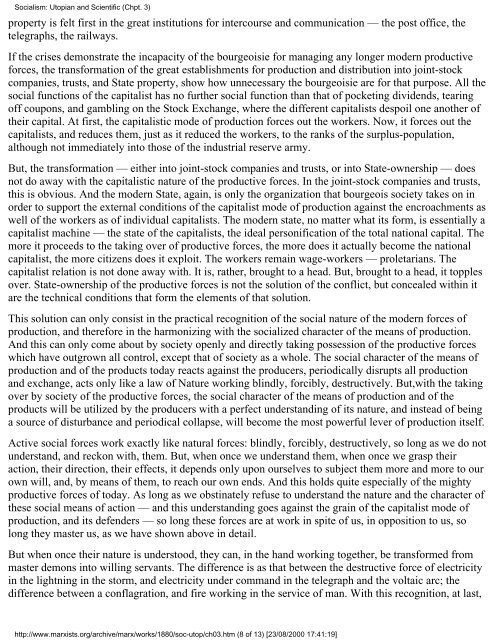Socialism: Utopian and Scientific - MIA
Socialism: Utopian and Scientific - MIA
Socialism: Utopian and Scientific - MIA
Create successful ePaper yourself
Turn your PDF publications into a flip-book with our unique Google optimized e-Paper software.
<strong>Socialism</strong>: <strong>Utopian</strong> <strong>and</strong> <strong>Scientific</strong> (Chpt. 3)property is felt first in the great institutions for intercourse <strong>and</strong> communication — the post office, thetelegraphs, the railways.If the crises demonstrate the incapacity of the bourgeoisie for managing any longer modern productiveforces, the transformation of the great establishments for production <strong>and</strong> distribution into joint-stockcompanies, trusts, <strong>and</strong> State property, show how unnecessary the bourgeoisie are for that purpose. All thesocial functions of the capitalist has no further social function than that of pocketing dividends, tearingoff coupons, <strong>and</strong> gambling on the Stock Exchange, where the different capitalists despoil one another oftheir capital. At first, the capitalistic mode of production forces out the workers. Now, it forces out thecapitalists, <strong>and</strong> reduces them, just as it reduced the workers, to the ranks of the surplus-population,although not immediately into those of the industrial reserve army.But, the transformation — either into joint-stock companies <strong>and</strong> trusts, or into State-ownership — doesnot do away with the capitalistic nature of the productive forces. In the joint-stock companies <strong>and</strong> trusts,this is obvious. And the modern State, again, is only the organization that bourgeois society takes on inorder to support the external conditions of the capitalist mode of production against the encroachments aswell of the workers as of individual capitalists. The modern state, no matter what its form, is essentially acapitalist machine — the state of the capitalists, the ideal personification of the total national capital. Themore it proceeds to the taking over of productive forces, the more does it actually become the nationalcapitalist, the more citizens does it exploit. The workers remain wage-workers — proletarians. Thecapitalist relation is not done away with. It is, rather, brought to a head. But, brought to a head, it topplesover. State-ownership of the productive forces is not the solution of the conflict, but concealed within itare the technical conditions that form the elements of that solution.This solution can only consist in the practical recognition of the social nature of the modern forces ofproduction, <strong>and</strong> therefore in the harmonizing with the socialized character of the means of production.And this can only come about by society openly <strong>and</strong> directly taking possession of the productive forceswhich have outgrown all control, except that of society as a whole. The social character of the means ofproduction <strong>and</strong> of the products today reacts against the producers, periodically disrupts all production<strong>and</strong> exchange, acts only like a law of Nature working blindly, forcibly, destructively. But,with the takingover by society of the productive forces, the social character of the means of production <strong>and</strong> of theproducts will be utilized by the producers with a perfect underst<strong>and</strong>ing of its nature, <strong>and</strong> instead of beinga source of disturbance <strong>and</strong> periodical collapse, will become the most powerful lever of production itself.Active social forces work exactly like natural forces: blindly, forcibly, destructively, so long as we do notunderst<strong>and</strong>, <strong>and</strong> reckon with, them. But, when once we underst<strong>and</strong> them, when once we grasp theiraction, their direction, their effects, it depends only upon ourselves to subject them more <strong>and</strong> more to ourown will, <strong>and</strong>, by means of them, to reach our own ends. And this holds quite especially of the mightyproductive forces of today. As long as we obstinately refuse to underst<strong>and</strong> the nature <strong>and</strong> the character ofthese social means of action — <strong>and</strong> this underst<strong>and</strong>ing goes against the grain of the capitalist mode ofproduction, <strong>and</strong> its defenders — so long these forces are at work in spite of us, in opposition to us, solong they master us, as we have shown above in detail.But when once their nature is understood, they can, in the h<strong>and</strong> working together, be transformed frommaster demons into willing servants. The difference is as that between the destructive force of electricityin the lightning in the storm, <strong>and</strong> electricity under comm<strong>and</strong> in the telegraph <strong>and</strong> the voltaic arc; thedifference between a conflagration, <strong>and</strong> fire working in the service of man. With this recognition, at last,http://www.marxists.org/archive/marx/works/1880/soc-utop/ch03.htm (8 of 13) [23/08/2000 17:41:19]














![tyf Enf=O=n]lgg](https://img.yumpu.com/47584932/1/190x245/tyf-enfonlgg.jpg?quality=85)

